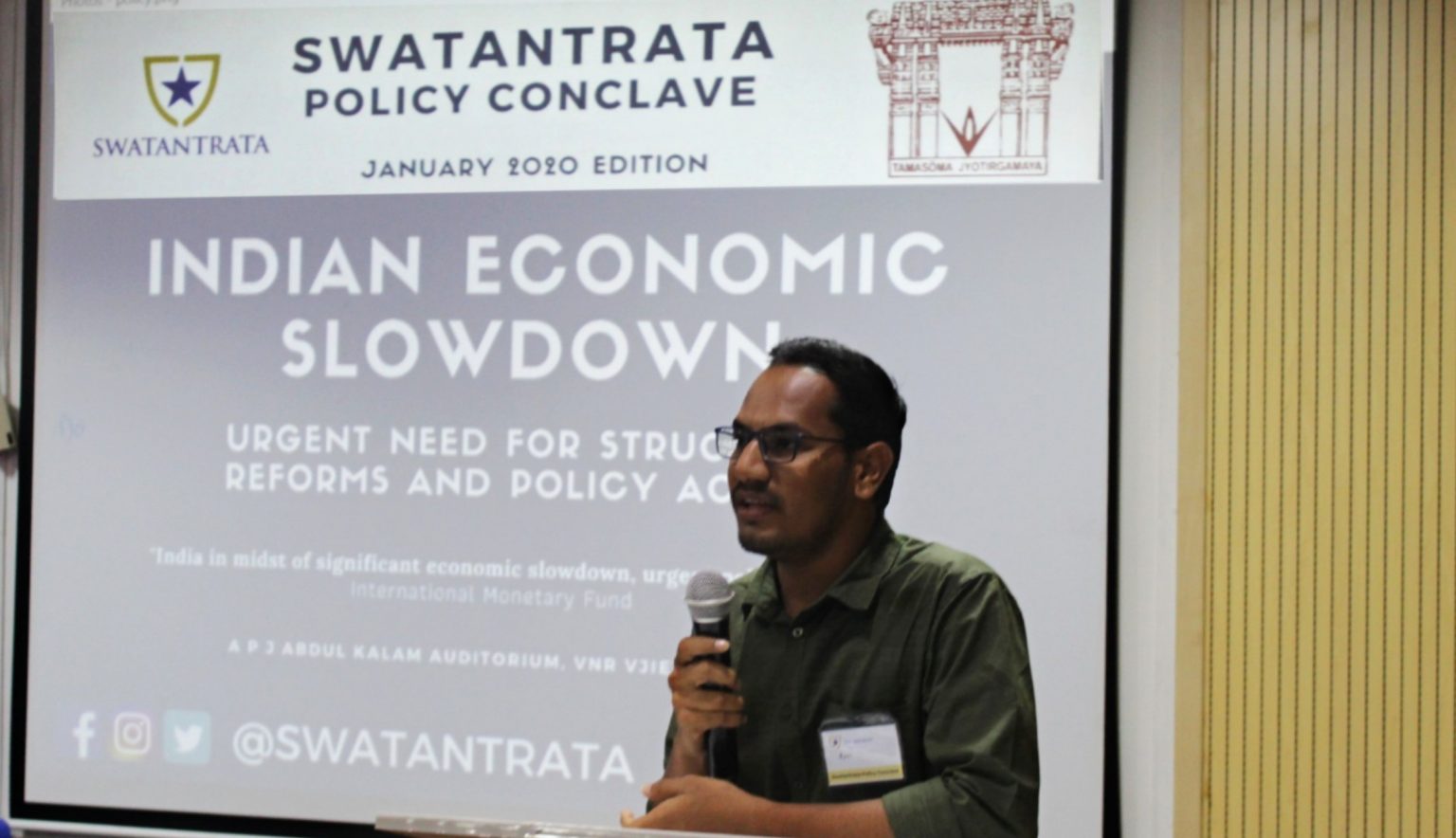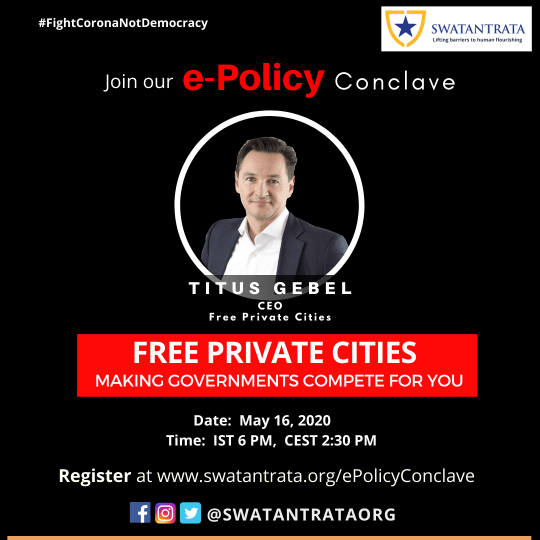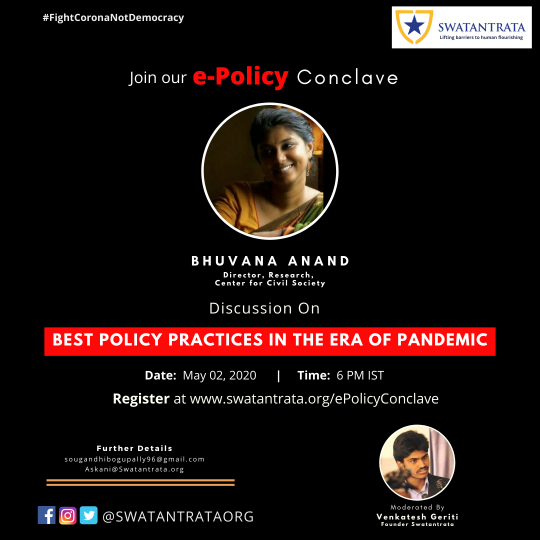Swatantrata
Policy Conclaves
“ India Economic Slowdown:
Urgent Need for Structural Reforms and Policy Actions”
Swatantrata is hosting first policy conclave on “ India Economic Slowdown: Urgent Need for Structural Reforms and Policy Actions” on 3rd January 2020 in Hyderabad with an objective to reinvigorate the reforms to boost inclusive and sustainable growth.


The Solution-oriented conclave is aimed at devising an action plan to address the issue of Significant Economic Slowdown in India. Swatantrata Policy Conclave (SPC) brings together expert speakers, thought leaders from multilateral organisations, civil society organisations and private sector to discuss a wide range of policy issues that contribute to Slow Economic Development. SPC provides a unique platform that helps to nurture young leaders to work on various policies that catalyse to transform real-world challenges.
We are looking forward to one day of exchange of ideas, brainstorming and strategizing which will help in shaping the policies of economic growth with inclusiveness and sustainability. The aim of the conclave is to encourage participants to think critically and contribute to constructive discussion. SPC is designed to give a holistic understanding of public policy and create change inducers and future leaders.
you can find a picture from the event here: SPC on economics slowdown
Here Videos of Swatantrata Policy Conclave
E - Policy Conclaves
- Swatantrata e- Policy Conclave a virtual discussion hosted by Swatantrata that will brings together various policy, development practitioners and researchers to discuss the current COVID19 pandemic. We are expecting to engage students, policy and development practitioners, entrepreneurs, academicians, and scholars.
COVID – 19 Pandemic: Time for structural policy reforms?
May 23rd 2020 : 6 PM IST | 2:30 CEST
With the onset of the Pandemic, several nations have opted for a complete shutdown to contain the spread of the deadly virus. The impact of the lockdown will be having a larger impact on the economy rather than Public health. In the midst of all the disruptions and economic fallout, there is still an opportunity to build a more resilient and diversified economy given push for more structural reforms, keeping in mind Economic Freedom as the guiding principle of the nation’s policymaking. Swatantrata believes that there is an urgent need to look Covid19 in a more comprehensive and integrated manner. Swatantrata brings together various policy, development practitioners and researchers to discuss the current COVID19 pandemic. On our platform we will be hosting weekly E- Policy Conclave (Pandemic Series) which aims to explore various topics such as Ethical and Legal Considerations in Mitigating Pandemic, Revamping Health Care System in India, Civil Society and NGO’s Response to the Pandemic, Best Policy Practices in the Era of Pandemic and Cherishing the Values of Life, Liberty and Property.

Dhiraj Nayyar
Chief Economist, Vedanta Ltd.
Former Head, Economics, Finance & Commerce, NITI Aayog.
Dhiraj Nayyar is Chief Economist of Vedanta Resources, an Indian multinational corporation in the business of mining, metals and oil. Before joining Vedanta in October 2018, Dhiraj was Officer on Special Duty and Head, Economics, Finance and Commerce, NITI Aayog, Government of India. Trained as an economist at St. Stephen’s College, Delhi, Merton College, Oxford and Trinity College, Cambridge, Dhiraj spent several years in the media in senior roles including Opinion Editor of Financial Express, Deputy Editor of India Today, Editor-at-large, Firstpost, India Columnist, Bloomberg View and Managing Editor of The Quint. He is the author of the bestselling book, Modi and Markets: Arguments for Transformation. In 2013, he was awarded a Bastiat Prize in journalism by the California-based Reason Foundation.
Some of article’s here :
- How to Make in India 2.0 : link
- Listen to thirty years ka experience
- Economies after Covid-19
- India facing twin crisis
Free Private Cities: Making Governments Compete For You
- Swatantrata e- Policy Conclave a virtual discussion hosted by Swatantrata that will brings together various policy, development practitioners and researchers to discuss the current COVID19 pandemic. We are expecting to engage students, policy and development practitioners, entrepreneurs, academicians, and scholars.
Free Private Cities: Making Governments Compete For You
May 16th 2020 : 6 PM IST | 2:30 CEST


Titus Gebel
President and CEO
Free Private Cities
Free Private Cities
Titus Gebel is the inventor of the Free Private Cities concept, President of the society of the same name and CEO of TIPOLIS. He is a German entrepreneur with a PhD in international law and an extensive worldwide network. He founded amongst others Frankfurt-listed mining company Deutsche Rohstoff AG, retired as their CEO in 2014 and emigrated with his family to Monaco. With Free Private Cities, he wants to create an entirely new product in the “market of living together”. If successful, it will fast-track knowledge and progress for humanity.
Titus has dedicated the rest of his life to making Free Private Cities a reality. Many distinguished experts convinced by the idea, have offered their support and have become advisors of Free Private Cities.
Today’s systems provide incentives for those in power to enrich themselves and their supporters at the expense of society, to waste other people’s money to enhance their own fame, and to buy votes through alleged free benefits. The so-called social contract can be changed by the government with its parliamentary majority de facto at will. how can we make these break these outdated institutions and provide viable alternative for A further Development if Human Coexistence.
Conventional systems are obviously reaching their limits in the 21st century. But there is a peaceful and above all voluntary alternative: Free Private Cities.
In emerging themes around urban planning and building sustainable cities, we always exemplify the complex trade-offs between states and individuals. Mostly, we end up attempting short-term interventions. Given the challenges of corruption, political instability, legal uncertainty, and cronyism it is important to find new alternatives. It might be difficult but not impossible to create a world where what we believe will affect the things we see, our choices that we like surround ourselves, and the individuals are left free to design their environment. The free Private Cities provide an alternative world view to the conventional system by providing competition to the Governments and creating a free society based on security, Liberty, and Prosperity. The concept of Private cities serves as an illustrative example of building sustainable cities based on individual rights and limited state intervention.
Swatantrata believes that there is an urgent need to look Covid19 in a more comprehensive and integrated manner. Swatantrata brings together various policy, development practitioners and researchers to discuss the current COVID19 pandemic. On our platform we will be hosting weekly E- Policy Conclave (Pandemic Series) which aims to explore various topics such as Ethical and Legal Considerations in Mitigating Pandemic, Revamping Health Care System in India, Civil Society and NGO’s Response to the Pandemic, Best Policy Practices in the Era of Pandemic and Cherishing the Values of Life, Liberty and Property.
How can Governments innovate like Startups?
Free Private Cities: Making Governments Compete For You
Best Policy Practices
in the Era of Pandemic
- Swatantrata e- Policy Conclave a virtual discussion hosted by Swatantrata that will brings together various policy, development practitioners and researchers to discuss the current COVID19 pandemic. We are expecting to engage students, policy and development practitioners, entrepreneurs, academicians, and scholars.
Best Policy Practices in the Era of Pandemic
May 2nd 2020 : 6 PM to 7 PM IST

In the last few weeks as a country, we have witnessed tremendous efforts put forth by Civil Society Organisations and NGOs in understanding the ground realities and providing humanitarian assistance and healthcare needs. In the phase of the pandemic, the NGOs have grown stronger, filling up the gaps which government is failing to do. Civil Society organizations and NGO’s have been rapidly adapting to social change and building social nexus in the times of Pandemic
Swatantrata believes that there is an urgent need to look Covid19 in a more comprehensive and integrated manner. Swatantrata brings together various policy, development practitioners and researchers to discuss the current COVID19 pandemic. On our platform we will be hosting weekly E- Policy Conclave (Pandemic Series) which aims to explore various topics such as Ethical and Legal Considerations in Mitigating Pandemic, Revamping Health Care System in India, Civil Society and NGO’s Response to the Pandemic, Best Policy Practices in the Era of Pandemic and Cherishing the Values of Life, Liberty and Property

Bhuvana Anand
Bhuvana Anand is Director, Research at Centre for Civil Society, one of India’s leading think tanks. Bhuvana’s subjects of interest are better regulation and governance, public finance management, and political economy. In India, she has worked extensively on welfare programmes across India, including reforms of the Public Distribution System and implementation of various Direct Benefits Transfers. At the Centre, she works on unpacking how government actually functions using administrative data, legislative analysis, field research, and machine learning. In addition, her team develops blueprints for programme design and policy implementation. Bhuvana has worked with various donors and civil society organisations in Sudan, Afghanistan, Sri Lanka, India and the United States, in policy advocacy, managing multi-pronged programs and research. She previously worked with the United Nations, the British Government’s Department for International Development, and most recently at MIT’s Poverty Action Lab.
“Reopening and reforming
India economy after Covid-19”
- Swatantrata e- Policy Conclave a virtual discussion hosted by Swatantrata that will brings together various policy, development practitioners and researchers to discuss the current COVID19 pandemic. We are expecting to engage students, policy and development practitioners, entrepreneurs, academicians, and scholars.
“Reopening and reforming India economy after Covid-19”
May 9th 2020 : 6 PM to 7 PM IST

India is reopening! We are too little thrilled to start our lives after the partial end of the Covid19 lockdown. In the phase reining the economic damage caused by Covid19 disruptions, anxiety clouds the outlook admits the lack of business slowdown and fall of informal sectors. We at our E-Policy Conclave provide analysis on the current economic system and try to bring a perspective of the Future Outlook as a response to the crisis.
Swatantrata believes that there is an urgent need to look Covid19 in a more comprehensive and integrated manner. Swatantrata brings together various policy, development practitioners and researchers to discuss the current COVID19 pandemic. On our platform we will be hosting weekly E- Policy Conclave (Pandemic Series) which aims to explore various topics such as Ethical and Legal Considerations in Mitigating Pandemic, Revamping Health Care System in India, Civil Society and NGO’s Response to the Pandemic, Best Policy Practices in the Era of Pandemic and Cherishing the Values of Life, Liberty and Property.

Dr. Jayaprakash Narayan
Lok Satta and FDR
Dr. Jayaprakash Narayan is a physician by training who went into the Indian Administrative Service in the aftermath of the Emergency and failure of the Janata Experiment. He was a topper in the IAS exam. During the 16 years of distinguished public service in various capacities, he acquired a formidable reputation in the erstwhile State of Andhra Pradesh. His experience in government convinced him that faulty governance process was the biggest hurdle to India and Indians achieving greater success. And what India needs today is a fundamental change in the rules of the game and not a periodic change of players. In order to translate his vision into practical reality, he resigned from Service (IAS) in 1996, and worked with like-minded colleagues for the formation of Lok Satta. Lok Satta has now emerged as India’s leading civil society initiative for governance reforms. Dr Narayan, through Foundation for Democratic Reforms, Lok Satta movement and other fora has been actively pursuing reforms in service guarantees in government offices, education, healthcare, local government empowerment, judicial and police reforms, various anti-corruption measures, and political reforms to transform governance, particularly at state and local levels.
